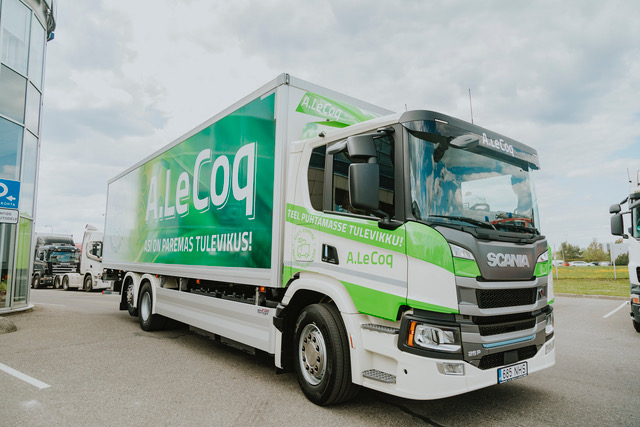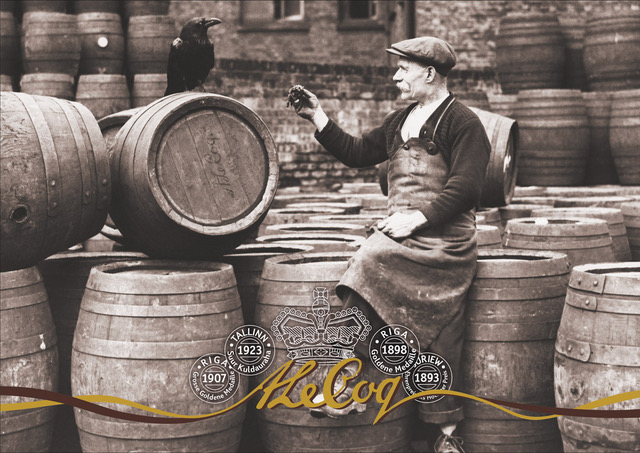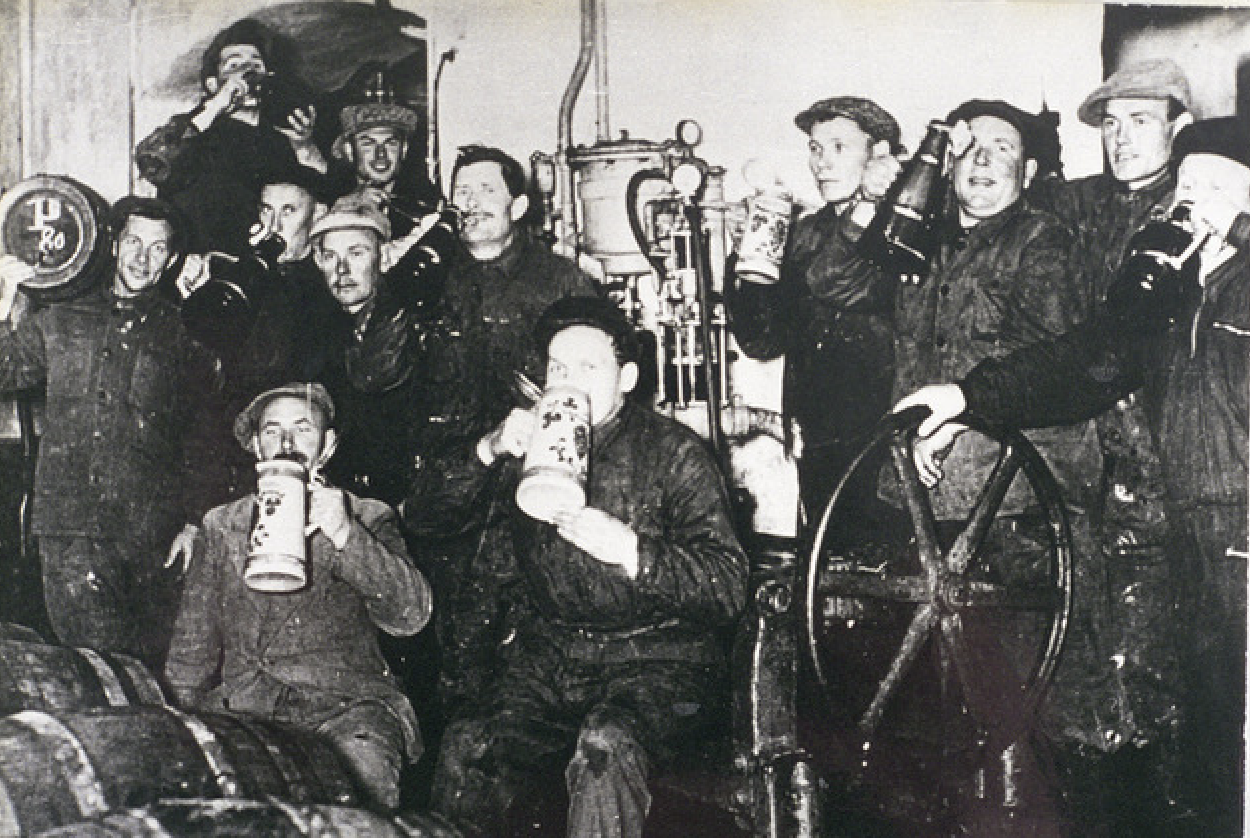
Our Story
This is A. Le Coq
A. Le Coq is the oldest brewery in Estonia and currently the beverage producer with the widest product portfolio in the Baltic Sea region. Our product range includes over ten categories, including beers, ciders, low-alcohol beverages, soft drinks, fruit wines, energy drinks, syrups, waters, juices, sports drinks, and tonics.
We are part of the Olvi Group, which is listed on the Helsinki Stock Exchange. Other companies belonging to Olvi Oyj include Helsinki Distillery, Servaali, and Olvi brewery in Finland, Cesu and Piebelga breweries in Latvia, Volfas Engelman brewery and Uniqua water plant in Lithuania, Lidskoe Pivo brewery in Belarus, and Vestfyen brewery in Denmark.
A. Le Coq’s roots date back to the early 19th century when the Le Coq family established the A. Le Coq & Co company in 1807 in Prussia, which was involved in the beverage trade. In the 1820s, Albert L. J. Le Coq moved to London to trade the products of the family’s vineyard. Alongside the wine business, he began bottling and exporting a Russian Imperial stout under his own name – A. Le Coq Imperial Extra Double Stout. This beer earned the prestigious title of the official beer supplier to the Russian Imperial Court.
The decision to relocate closer to the primary market was made in 1904. The owners of the brewery spent years searching for a suitable brewery in Russia for producing imperial stout, but eventually, AS Tivoli in Tartu was chosen as the preferred location, where the company still operates today. The main reason for this choice was the high-quality and clean groundwater located beneath Tähtvere Hill, which is a crucial component in beer and beverage production.
Throughout the years, the factory located in Tähtvere has been at the forefront of innovation. As early as the 19th century, the factory produced not only beer but also soft drinks, mineral water, fruit wines, carbonated water, and fruit juices. During the Soviet era, the resourcefulness of the brewery’s employees drew attention, and the factory was renamed as Tartu Experimental Brewery. It was there that novel recipes and technologies were developed, leading to the production of products throughout the entire Soviet Union. The most renowned among them are still beloved today, such as Kelluke (1965) and Traditsiooniline Limonaad (1936).
In the late 1990s, the brewery was acquired by the Finnish beer producer Olvi. The A. Le Coq brand was reintroduced, marking the beginning of the Olvi Group. Investments in technology and the revival of the A. Le Coq brand positioned the company as one of the most successful beverage producers in the region. Currently, A. Le Coq exports its products to over 70 countries.
Today, A. Le Coq is one of the most esteemed companies in Estonia, consistently ranking among the top ten most reputable large enterprises. We have been honored for years as Estonia’s most competitive food and beverage producer, and our products are highly regarded both locally and internationally. We believe that the way we produce our products and conduct our business contributes to making the world a better place.
We value the environment and strive to preserve it through meaningful actions. We care about our consumers and offer products that support their lifestyles.
We value our employees and invest in their development. We carefully select our partners and ensure that their values align with ours. Only then can we guarantee that life is flavorful.
By prioritizing the development of your employees, choosing like-minded partners, and striving to bring taste to life, A. Le Coq is fostering a positive and impactful presence in the industry.
Awards and Recognitions
As Estonia’s largest and oldest beverage producer, A. Le Coq has received numerous societal recognitions throughout its history.
With roots dating back to the early 19th century, the company has proudly upheld the banner of the beverage industry. References to our earliest recognitions can be found in the historical book “Õllelinn Tartu. A. Le Coq 1807−2007” (2007, A. Sepp) and are also exhibited in the permanent display of the Beer World exhibition. From its heyday during the first Republic of Estonia to the accolades received during the era of the Tartu Experimental Brewery and up to the present day, all these affirm the company’s societal contribution and business success spanning over two centuries.
The revival of the A. Le Coq brand in 1999 was based on significant investments made by the new owners in production, enabling the production of beer with the most modern equipment and technology in the region. Since then, the brewery, now a beverage industry leader, has garnered notable recognitions from various societal partners.
Business Development
A. Le Coq’s vision is to be the leading beverage producer in Estonia, creating positive experiences for our stakeholders. Business development must be sustainable, requiring increased contributions and involvement in topics that promote environmental sustainability and societal development.
From the 2000s to the present day, A. Le Coq has been recognized on various occasions as the largest company in the Tartu region, the company creating the most jobs, the most responsible company, and the best partner for vocational education promotion. Additionally, we have consistently ranked at the top or within the top three in the annual rankings of beverage producers by Äripäev.
From 2006 to 2022, A. Le Coq was chosen as Estonia’s most competitive food industry company 14 times.
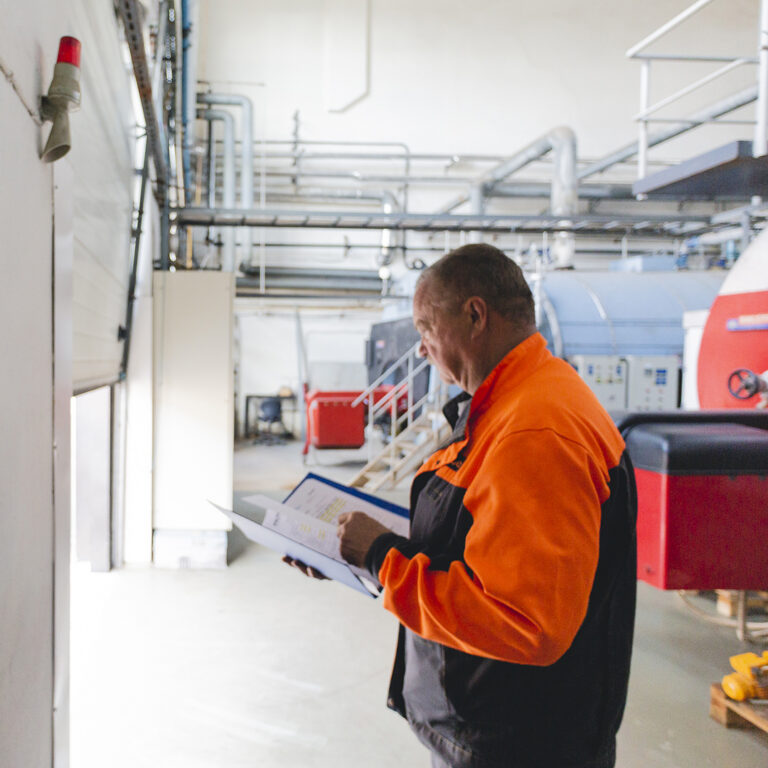
Social Engagement
In preparing and implementing projects, we strive to be the best and create a success story that goes beyond our company. We aim to contribute to societal development and the future, being part of a positive change. We are grateful and proud of the recognition bestowed upon us.
Estonian Marketing Achievement of the Year (1999) – Relaunching the A. Le Coq brand
Logistics Achievement of the Year (2007) – Technical solution of the new logistics center
Estonia’s Most Reputable Company 2019
Most Desirable Employer in the Food Industry Sector 2021
Sports Friend 2022 – Contribution to the development of Estonian football
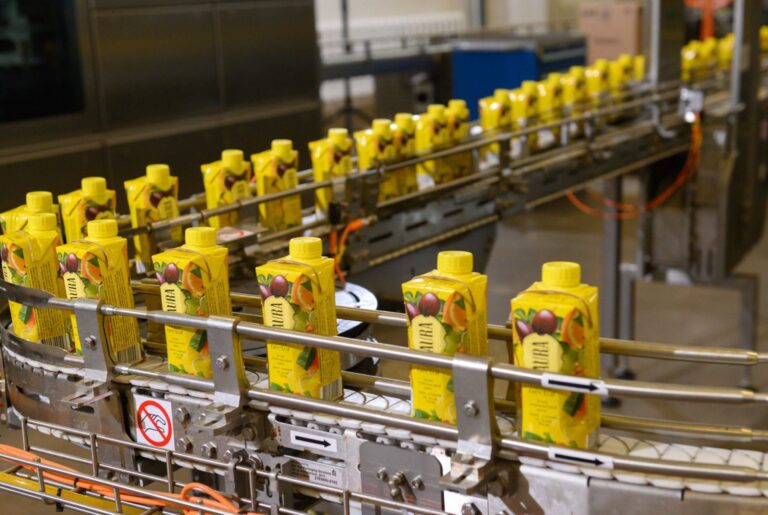
Success of Our Products
Being recognized as Estonia’s largest beverage producer encompasses our wide product portfolio, but the awards and titles attributed to our products give a glimpse into our daily work of developing new products. Here are a few examples:
Golden Medals for Best Non-alcoholic Beverage in the Estonian Best Food Product Competition – Aura Organic Apple Juice (2022), Aura Super Smoothie (2020). Previous awards have been received since 2003.
Golden Medals for Best Beverage in the Estonian Best Food Product Competition 2022 – Best Lager Beer, Alexander Bohemian; Best Non-alcoholic Beer, A. Le Coq Beer Mail IPA.
Silver and Bronze Medals in various beer categories at the Baltic Beer Star competition in 2015, 2017, and 2018.
Successful New Product recognized by NielsenIQ – Soft drink Barbariss (2022), unfiltered beer Alexander (2020). Category wins in different segments since 2014.
If you have any innovative and exciting ideas that could improve the lives of future generations in Estonia and align well with our industry, please share them with us, and we will get in touch with you.
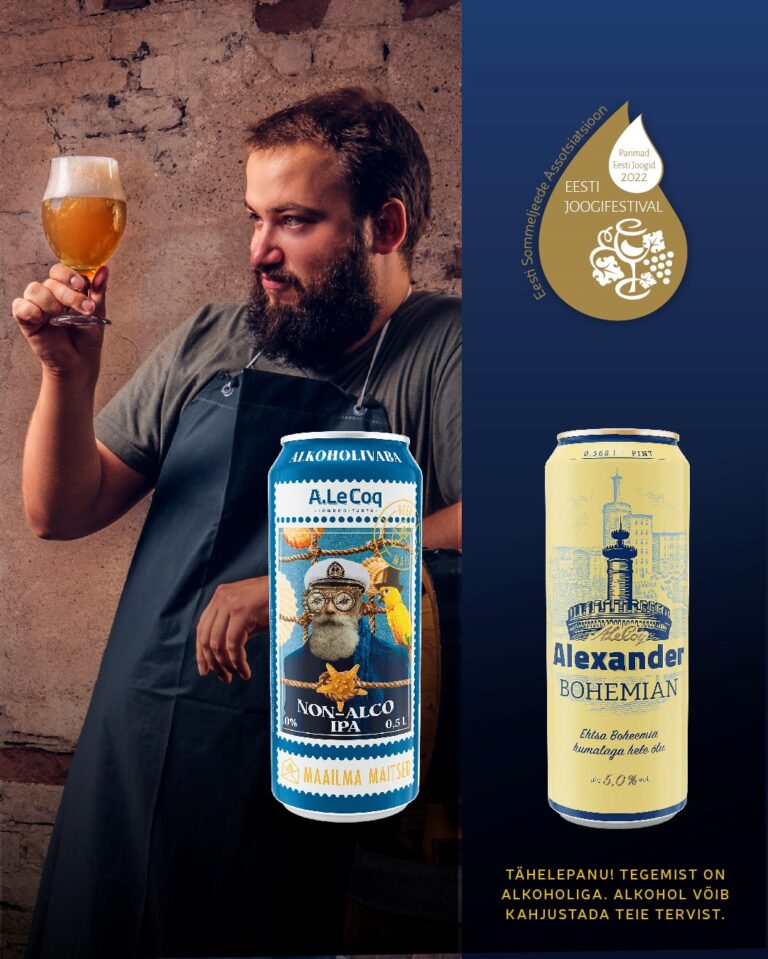
History
1461 ‒ The Beginning of Beer Brewing in Tartu
Tartu (Dorpat, Дерпт, 1893–1917 Jurjev) became the centre of an agricultural region and the passing trade routes as early as in the second half of the first millennium. And people have probably been brewing and drinking beer there for as long as they have been baking bread.
In the 13th century, a settlement spread around the bishop’s stronghold and the German tradesmen and craftsmen of this town cooked and brewed their favourite drink in the brewing kitchens by their homes.
Everything related to beer as the source of income was strictly regulated in towns. The malt had to be ground in the malt mill (Meltsiveski, Malzmühle) that belonged to the town. According to the privileges given to the town first by bishops and later by kings, the right to brew beer for sale belonged for a long time to tradesmen of the Great Guild.
Craftsmen of the Small Guild were allowed to brew beer only for their own use. The required order was established in the brewing statutes of the Big Guild (Brauerschragen), which were first mentioned in 1461.
In 1783, Russian Imperial powers ordered the establishment of Tartu Brewing Company (Brauer-Compagnie), which was basically a social welfare body which could have an equal number of members both from the Big and the Small Guilds. These had to be without exception widows who had lost other sources of income, orphans or town citizens who had lost everything by no fault of their own. All others were banned from brewing beer and a brewing house was built for the brewing company on the banks of the Emajõgi River. The beer made there was sold in 30 pubs owned by the town.
This order lasted until the end of the regency, when it was realized that the primitive brewery of the Brewing Company and the quality of beer did not meet the expectations and demand of the townspeople. Better beer was transported to the town from nearby manors and this situation made it hard for the town to collect beer taxes. As a result, the company started leasing its brewing rights to private tradesmen.
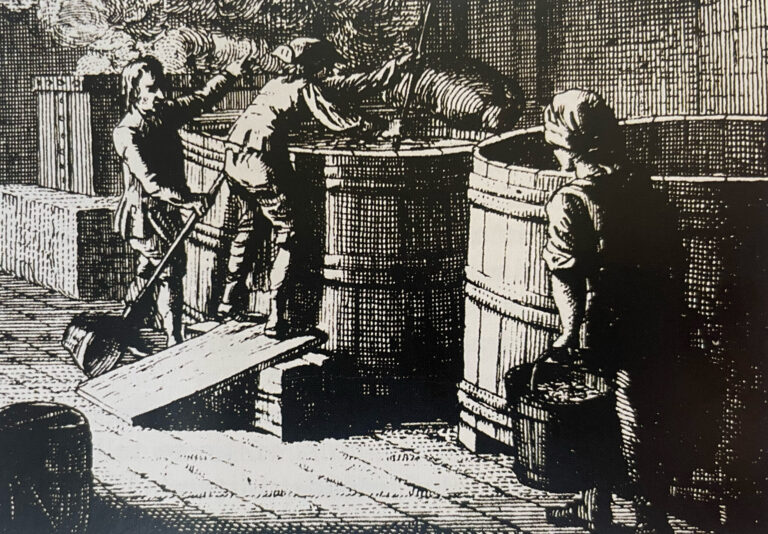
19th Century ‒ First Private Breweries
Many small private breweries started operation in Tartu in the beginning of the 19th century.
Direct predecessors of A. Le Coq, the oldest Estonian brewery that has been continuously operating, are the breweries of B. J. Hesse (founded in 1800) and J. R. Schramm (founded in 1826).
Two other smaller breweries – Gambrinus and Livonia – were joined with the company in 1863. In the course of time, a large enterprise Tivoli Ltd was formed from these companies and in 1913 the owners renamed it A. Le Coq Ltd.
In the end of 1825, Justus Reinhold Schramm was granted the status of a Tartu guild tradesman. He had become a brewer in 1822 and had previously worked in the largest brewery in Tallinn, which belonged to his mother. He first started brewing in a rented small brewery (built in 1823) and became the first to start producing quality lager in Tartu.
In 1827, he started building a new brewery on the registered immovable on Rüütli Street that was completed in 1832. In 1827, he rented the former gunpowder cellar in Toomemägi hill as his lager cellar.
After the death of J. R. Schramm in 1851, the company was managed by his son until 1863. From then on, the successors rented out the department store and the brewery that both carried the name of J. R. Schramm. The company that was located in the town centre was expanded in 1860, and in 1874, the production became powered by steam. Several vodka products were also made in addition to beer and mead between 1861 and 1914. The company also owned a large colonial store.
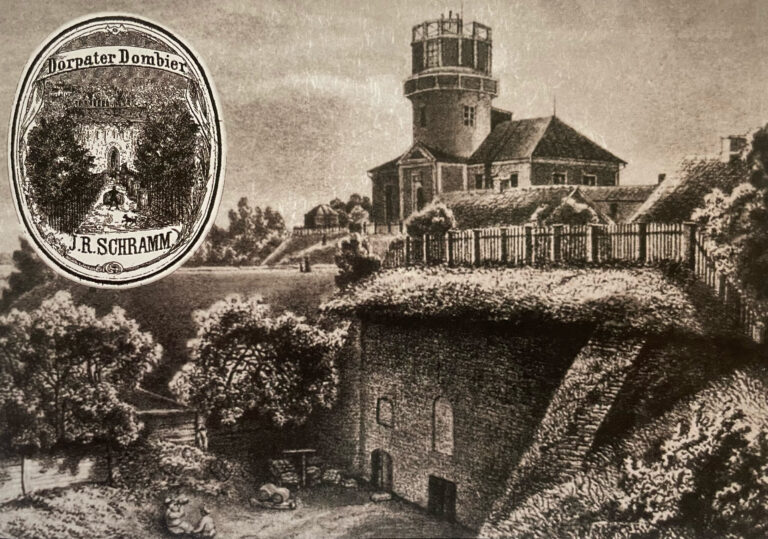
1807 ‒ Birth of A. Le Coq
A . Le Coq & Co. traded in drinks and the company had been founded in 1807 by a Prussian family of the same name, who were descendants of the Huguenots who had fled France in the 17th century.
In the 1820s, Albert L. J. Le Coq moved to London so he could trade with products of the family’s wine manor. He soon started bottling and exporting Russian Imperial Stout under his own name. He ordered this special dark and strong top-fermented beer that was brewed specifically for the Russian market from large breweries in London. In his old age, A. Le Coq sold his London company to the Sillem family in 1870s.
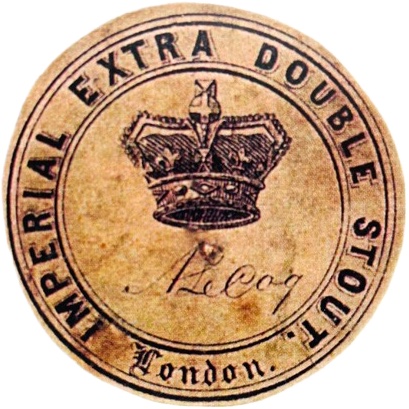
1893 ‒ Tivoli LTD in Tähtvere
In 1885, Julius Moritz Friedrich bought the rented company from the heirs of Schramm and in 1893 renamed it Tivoli and moved all production to Tähtvere, where the large lager cellars of the company had been built already in between 1879-1880.
The owner transformed Tivoli into a public limited company in 1896, remaining a majority shareholder himself. A magnificent red brick brewery complex was built on Tähtvere Hill in 1894-1896, most of which has been preserved until today. In addition to local towns, Tivoli Ltd. marketed beer also in St. Petersburg and Pskov. In 1896 the company started to produce soft drinks.
By the end of the 19th century Tartu had become a true beer town with six operating breweries.
In 1900, Tivoli Ltd. acquired the oldest beer company in Tartu, which had been founded in 1800 by the great grandfather of Nobel Prize-winning Hermann Hesse, member of Tartu brewing company Barthold Joachim Hesse. In 1829, B. J. Hesse’s widow sold the brewery to a tradesman Alexander Diedrich Musso who in 1831 built new production premises on an immovable property behind the Town Hall, between Jaani Street and Toomemägi. The company that since 1880 had belonged to A. D. Musso’s heirs was bought at the turn of the century by Tivoli. The new name of the company became Tivoli II, or Tivoli Ltd. Jaani Street Brewery. The headquarters of Tivoli Ltd, were also moved to Jaani Street.
In the first decade of the 20th century, the majority shareholder of Tivoli, M. Friedrich wanted to withdraw from active business because of old age. He soon, found a suitable buyer for the company – A. Le Coq – the British company who had been importing imperial stout to Russia.
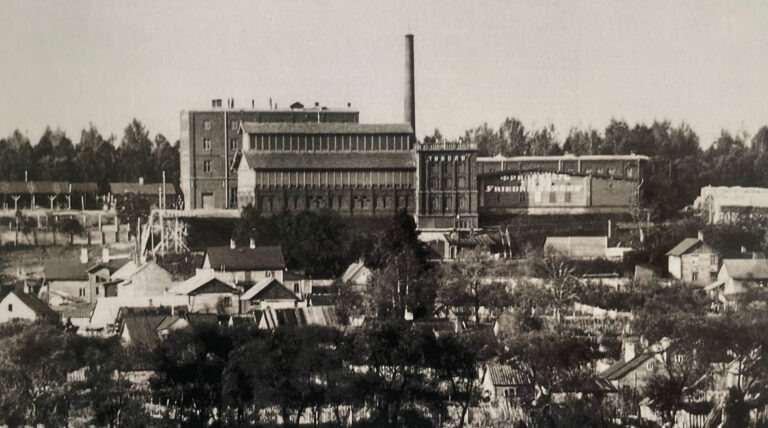
1912 ‒ A. Le Coq Moves to Tartu
The high customs duties imposed by Russia and the increasingly frequent forgery of the reputable A. Le Coq trademark forced A. Le Coq & Co. (Russia) Ltd., which had been changed into a private limited company in 1904, to move its headquarters and in 1906 also the bottling plant from London to St. Petersburg.
In 1912, A. Le Coq Ltd. was chosen as the official supplier of the Russian emperor’s court. The owners of A. Le Coq looked for a brewery suitable for the production of imperial stout in Russia and selected Tivoli Ltd. in Tartu. After water analyses were approved, H. O. Sillem bought all company shares in March 1912. On May 16 the same year, public limited company A. Le Coq Ltd. was established in London for development of the company and the company in Tartu operated as its Russian subsidiary.
Before World War I, a new stout department was built for the brewery that was managed by a brewer hired from England. A. Le Coq Imperial Extra Double Stout now came with a label saying “Brewed in Dorpat” and travelled by railway to consumers in the furthest corners of the empire – to Poland, Siberia and the Far East.
The impressive success was cut short by the prohibition on selling alcohol in Russia in 1914 due to the break out of World War I. In 1917, the brewery on Tähtvere Hill was vandalized by anarchist Russian soldiers and in 1918, the armed forces of the German Empire plundered the remaining equipment.
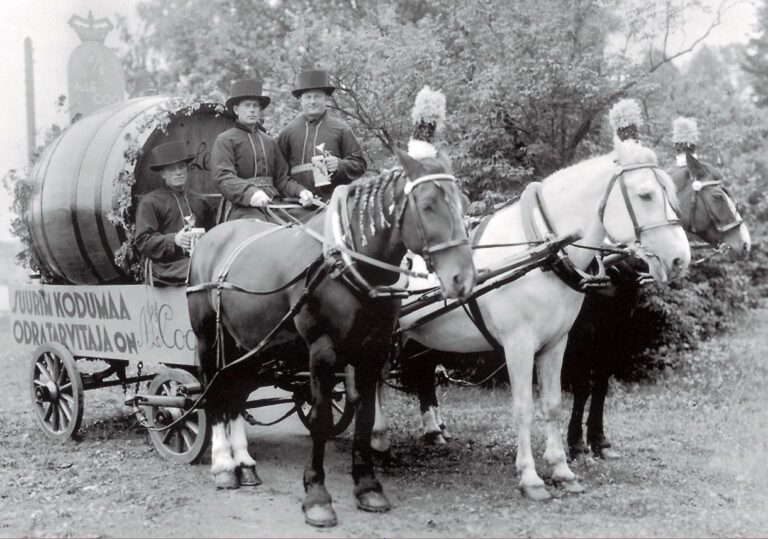
1921 ‒ A. Le Coq in the Republic of Estonia
In the independent Republic of Estonia, Tartu brewery of A. Le Coq Ltd. started operating again in 1921. In 1926, A. Le Coq Ltd. bought the trademark of the Gambrinus brewery (founded in 1863) which operated on Emajõe Street in Tartu.
In the same year, Estonian beer manufacturers entered into a mutual agreement of distribution zones. The established trust divided the sales zones as follows: A. Le Coq Ltd. got Southern Estonia and Saku Brewery got Northern Estonia. Most small breweries were turned into distributors of the aforementioned two large companies. The trust agreement expired in 1933 and A. Le Coq beer was once again sold all over Estonia.
Big demand for the Tartu beer in the capital led to the opening of a modern Tallinn division in 1938. In addition to the bottling of beer, this was where more than half of popular A. Le Coq soft drinks were produced.
According to the secret protocol of the Nazi German-Soviet Non-aggression Pact from of August 1939, the two parties to the pact divided Poland, Bessarabia, the Baltic States and Finland between themselves. In the summer of 1940, Estonia was annexed by the Red Army and a new puppet government nationalized A. Le Coq and Livonia breweries, among others. Foreign citizens, including the last director of A. Le Coq, Englishman J. H. Sillem and German brewmaster H. Dietz soon left Estonia.
Estonia was annexed by the Soviet Union in 1940. Thousands of citizens of the Republic of Estonia were thereafter murdered or died in Soviet concentration camps, amongst them the former owners of Livonia, beer manufacturers Ants and Albert Silvere.
The Government of the United Kingdom compensated the English owners of A. Le Coq for the assets of the nationalized companies using the money obtained from selling the gold of the Republic of Estonia that had been frozen in the Bank of England in 1969.
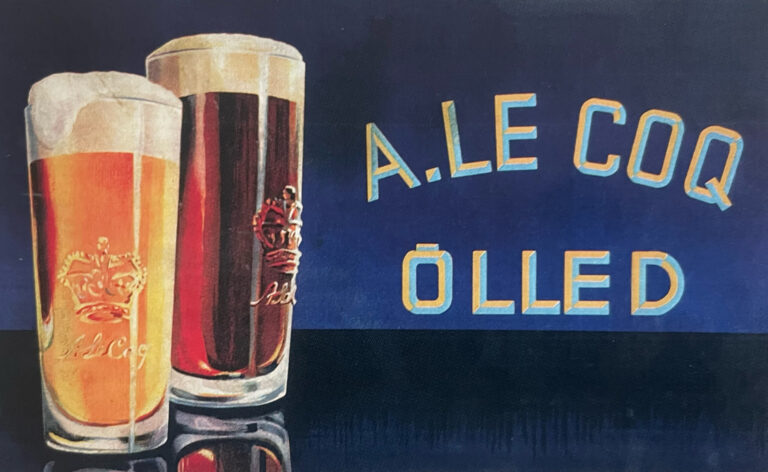
1941 – New Name – Tartu Õlletehas
In January 1941, the nationalized enterprise was named Tartu Õlletehas (Tartu Brewery). The former Livonia was merged with it in April and became the Kalda Street Department.
Kalda Street brewery (founded in 1863) that had repeatedly changed owners, was modernized into a steam brewery in 1910 and from 1916, it belonged to an Estonian called Ants Silvere (whose name before 1935 had been Hans Silbergleich). Livonia operated outside the trust contract and its sharp competition caused a lot of trouble for the trust. In 1930, management of the company was taken over by A. Silvere’s son Albert, who had studied beer technology in Czechoslovakia and Germany.
In 1939, all business enterprises belonging to the company were reorganized into public limited company A. Silvere & Ko. The brewery was seriously damaged during the war in the summer of 1941 and the production buildings were completely destroyed in 1944.
During World War II in 1941-1944, the company operated as the state-owned Bierbrauerei Dorpat. Approximately 80% of its production was consumed by the German army.
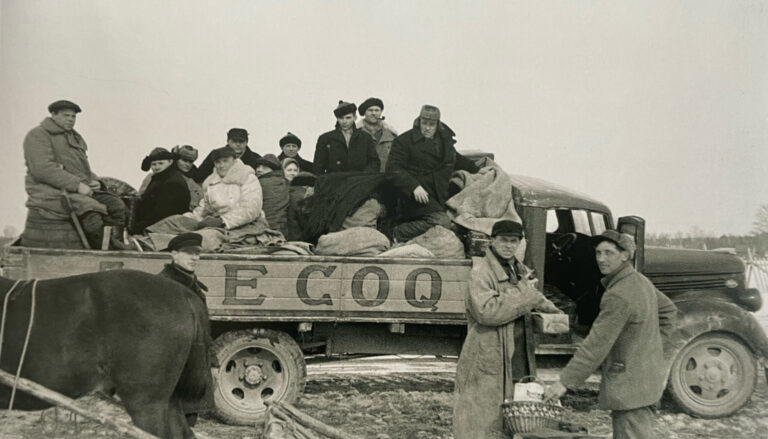
1944 – The Soviet Era
The Soviet regime was restored in Estonia in autumn 1944 and during the next decades, the company operated on the basis of a state-approved production plan. The production volumes of Tartu Õlletehas were constantly increased and the high level of new specialists turned it into one of the leading Soviet breweries in the 1960s.
Many technological innovations were developed in Tartu in cooperation with central Soviet institutions, which were later implemented in other breweries all over the USSR. In 1973, the company’s achievements were rewarded with the name Tartu Eksperimentaalõlletehas (Tartu Experimental Brewery). By the 1980s, beer production had grown by almost six times when compared to pre-war times. Bottling of the first Estonian mineral water, Värska, started in 1968 and it was also supplied to other regions of the USSR.
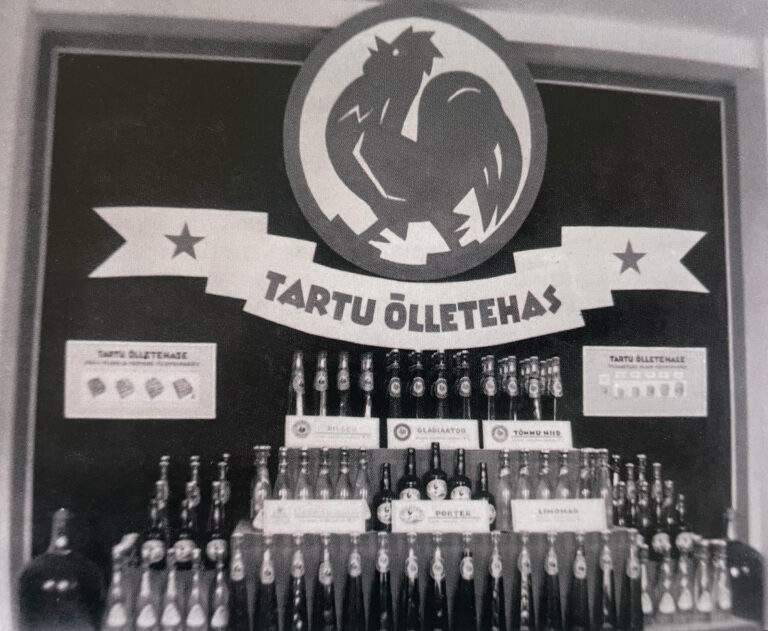
1995 – A New Beginning
After the years of privatization, the state-owned Tartu Õlletehas was having hard times – its market share had diminished to a great extent and the main competitor, Saku held a strong position.
In 1995, Magnum Konsuumer Ltd, a subsidiary of an Estonian pharmaceutical company Magnum Medical acquired Tartu Õlletehas. The new owners started to modernize the company and were looking for a strategic foreign investor. In 1995 over 30 million kroons (nearly 2 million Euros) were invested, and another 50 million kroons (3.2 million Euros) were invested a year later. New wort separation and filtration equipment as well as beer fermentation tanks and the first pasteurizer were bought. The new PET-bottle filling line made it possible to produce lemonade, Värska and long drinks in plastic bottles.
In June 1996 Finnish brewery Olvi Oyj acquired 15% of Tartu Õlletehas shares. After hefty investments, Olvi Oyj bought the remanining 85% of Tartu Õlletehas shares on September 15, 1997, worth 52 million Finnish marks (8.74 million Euros). In addition, Olvi Oyj also bought the Saare Õlu brewery. The market share of the two acquired companies combined was about 25%.
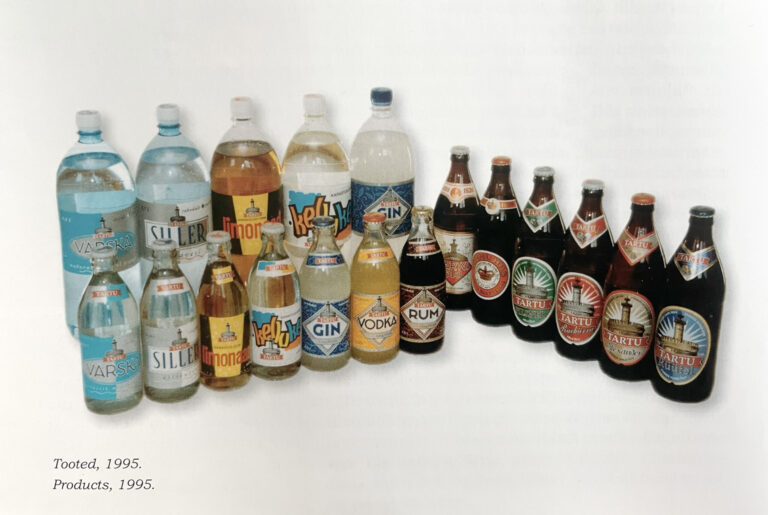
1999 – Relaunch of A. Le Coq Trademark
The Finnish holding company decided to completely renovate the brewery in Tartu. Substantial investments by Olvi Plc. (new fermenting cellar, boiling unit, bottling line, filter and new storage facilities) turned Tartu Õlletehas Ltd. into a company with up-to-date equipment that was the most modern one in the Baltic region at the time.
Top quality production facilities made it possible to set higher marketing and sales goals. In May 1999, A. Le Coq trademark was relaunched and the first products to bear the new brand name were Premium lager, Porter and Pilsner as well as mineral water Vichy. In order to preserve the history and traditions of A. Le Coq, Olvi Foundation donated 100 000 Finnish marks to set up a beer museum which was opened to visitors on July 1, 2003.
Thanks to good management, high quality and marketing support, the demand for A. Le Coq beer exceeded the production capacity by about 30% in the summer of 1999. The sales of soft drinks, waters and long drinks were also successful. The relaunch of A. Le Coq trademark was given the title of the best marketing campaign by the Estonian Marketing Centre and Marketing Institute in 1999.
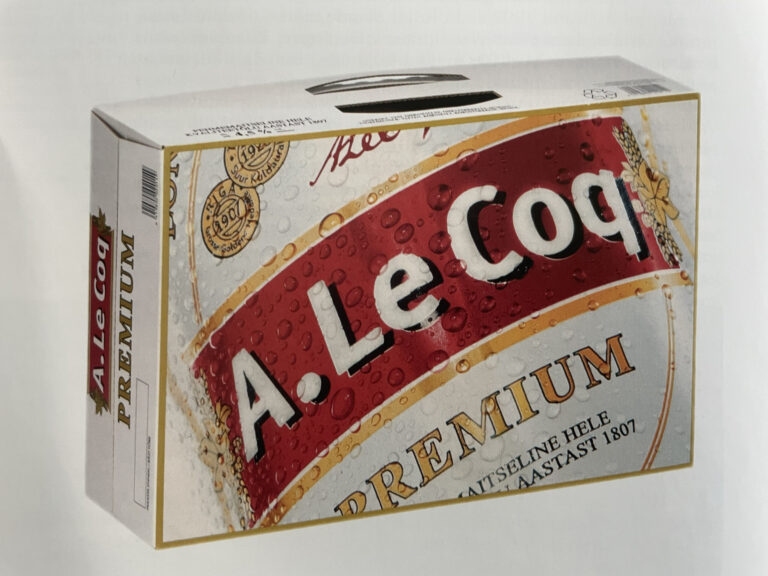
2004 – The Largest Estonian Beverage Producer – A. Le Coq
In the beginning of the 21st century, A. Le Coq became the largest manufacturer of beverages in Estonia, having increased the number of product groups up to ten, including waters, juices, soft drinks and sports drinks along with alcoholic drinks such as beer, cider and long drinks. It was the time when A. Le Coq became the market leader in the juice, sports drink, cider and long drink categories.
New filling lines for cans and plastic bottles, new pasteurization equipment for bottling beer and juice as well as the introduction of new, high quality plastic bottles have all contributed to the current success of A. Le Coq.
Major breakthrough for A. Le Coq was in 2003, when the company acquired the juice manufacturer Ösel Foods Ltd. and continued the production of Aura juices. In 2004, A. Le Coq became the first beverage manufacturer in Estonia whose annual production exceeded a hundred million litres of beverages, further securing the company’s leading position in the market.
In 2005, the company started to produce near waters, a new product group in the Estonian market. The same year also saw the launch of foil-covered cans and a year later, embossed cans. In 2006, A. Le Coq bought a new filling line for cans that made it possible to produce 6-packs with a convenient handle. An important milestone for A. Le Coq Ltd. was the relocation of its storage house and distribution to a new logistics centre, leaving more space for the PET bottling line, thus doubling the production capacity of plastic bottles.
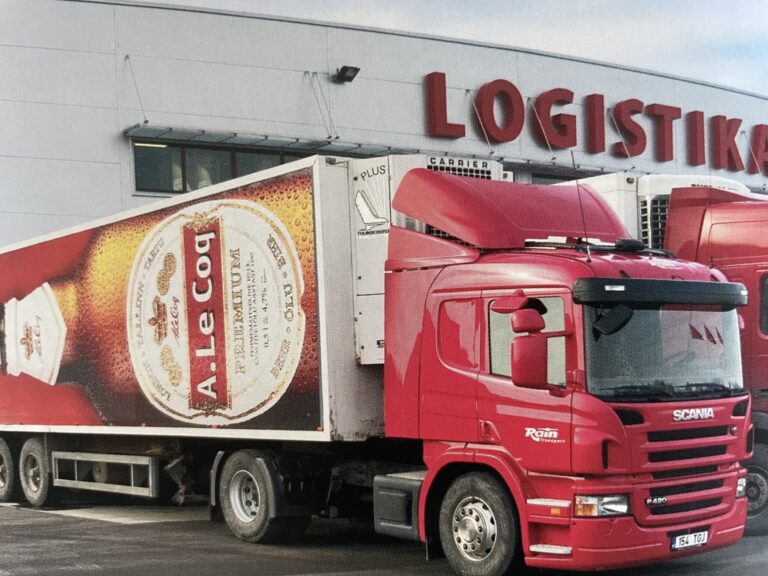
2007 – A. Le Coq Bicentennial
In 2007, the company celebrated its 200th anniversary. The company name, A. Le Coq Tartu Brewery (A. Le Coq Tartu Õlletehas), was shortened into A. Le Coq Ltd., which was previously used from 1913 until 1940.
In April, the company launched a new quality beer A. Le Coq Special which was brewed to mark the bicentennial of the company. Nearly 6 million kroons (ca 384´000 Euros) were invested to launch this signature beer.
To mark the bicentennial, Andres Sepp, an Estonian beer history expert and the leader of the NPO Estonian Beer History Association, compiled a book „Õllelinn Tartu. A. Le Coq 1807-2007″ (Beer Town Tartu. A. Le Coq 1809-2007). The generous, 400-page publication gives an overview of beer history and traditions of Estonia, as well as the birth of A. Le Coq trademark and its launch in Estonia.
In 2007, A. Le Coq launched a new product category and started to produce Dynami:t energy drinks. In early 2008, the company entered another new product category – syrups.
In 2009, A. Le Coq relaunched the long-forgotten production of kvass and started to produce A. Le Coq Kvass. The natural A. Le Coq Kvass is produced from rye and barley malt and it has been fermented with yeast and healthy lactic bacteria, just like in the olden days. This product was a great success and it was awarded the title of Best New Product of Estonia in 2009. Today A. Le Coq Kvass is the most beloved kvass among Estonians.
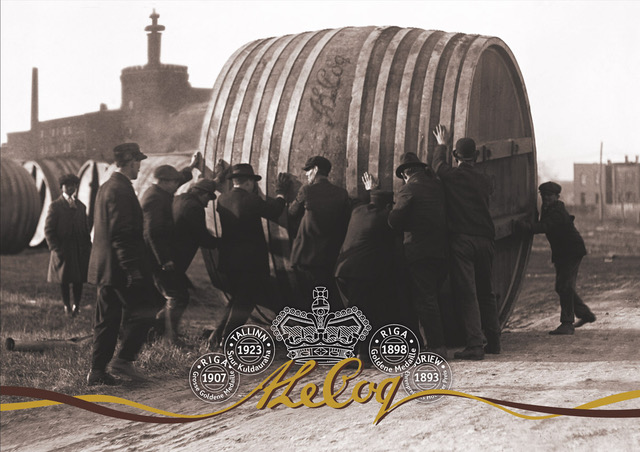
2010 – New Product Groups in the Portfolio
In 2010, the company was the first in Estonia to start producing triple-filtered beer under the brand name of A. Le Coq Extra.
Also, it was the first brewery in Estonia to produce corn beer, A. Le Coq Maíz. In the spring of 2010, A. Le Coq entered the cola segment of the soft drink market and started to produce Royal Crown Cola (RC Cola), a drink that originates from the US. The original recipe of RC Cola dates back to 1905 when a pharmacist Claude Hatcher started to produce and sell it in the state of Georgia, USA. Today RC Cola is the third largest cola brand in the world that is produced in about 60 countries worldwide.
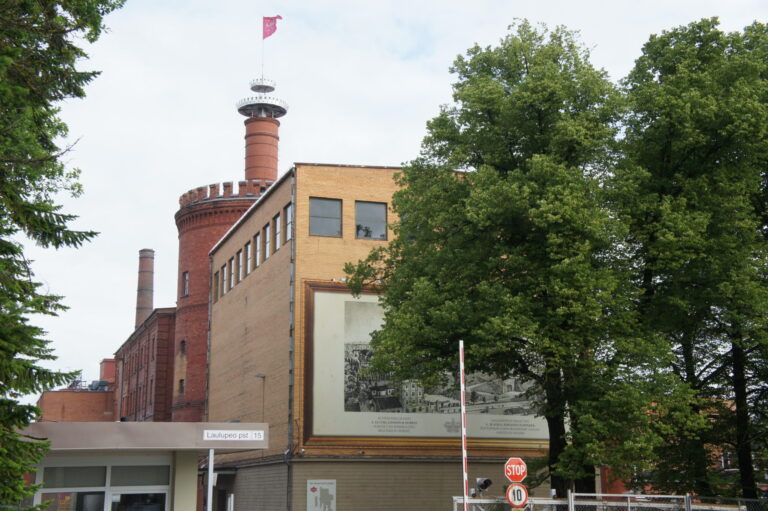
2016 – Developer of Estonian Beer Culture and the Leading Beverage Producer
A. Le Coq is currently the leading beverage producer in Estonia, holding first or second place in all market segments in which it operates, based on the average data for 2015. The company’s key brands are A. Le Coq, Fizz, Aura and Limonaad.
A. Le Coq continues to broaden its product portfolio and is constantly active in R&D. In 2012, the company launched Organic Beer – the first such beer in Estonia. In spring 2013, the company relaunched its historical beer – A. Le Coq Imperial. A. Le Coq Imperial Ale, Gold and Märzen are the successors of Imperial Extra Double Stout, which in 1912, had been given the title of the official beer of the Russian emperor’s court.
As the oldest brewery in Estonia, A. Le Coq is promoting Estonian beer culture and training both the service sector and consumers under the name Beer Star since 2011 with the goal to improve the quality of serving beer in Estonian pubs and restaurants. The Beer Star quality sign is accredited to pubs and bars that have successfully passed the course and are serving beer excellently.
In autumn 2013, Beer Star and the Estonian Sommelier Association launched a joint initiative – the Best Estonian Beer Sommelier competition. This is a unique competition in the Baltic and Scandinavian region. The first Best Beer Sommelier title was given to Kristjan Markii. In 2014, the winner was Urmas Lillemägi.
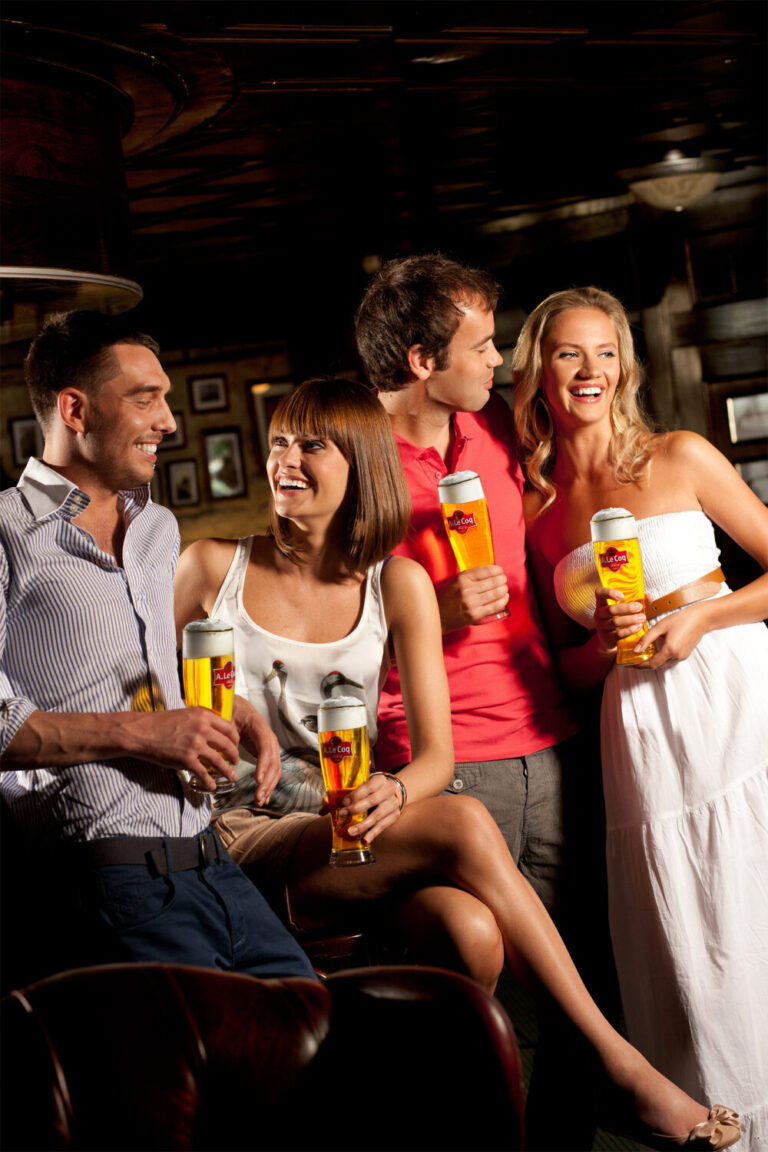
2021 – Environmentally friendly investments and opening of the Beer World
The year 2021 marked a significant year of transition towards sustainability within the company, and it became a founding member of the sustainability organization Rohetiiger. Between 2020 and 2022, over 5 million euros were invested to reduce the company’s ecological footprint, promising future generations a better world to live in.
As a pioneer in Estonia, the company introduced 100% recycled plastic water bottles and transitioned to using entirely green electricity.
A solar park was installed on the roof of the logistics center, and an Energy Track energy management system was implemented in production. In 2022, a biogas and wastewater treatment plant was inaugurated on the factory premises, and the company became the first in the Baltics to acquire a fully electric truck for transportation in the city center of Tallinn.
In the historic malt drying tower of A. Le Coq’s brewery, Beer World was opened in the spring of 2022. In addition to its unique architecture, you’ll find exciting installations and interactive exhibits as well as fascinating stories and legends in the Beer World. The story of beer culture, which spans thousands of years, is told in the Beer World, one of the most contemporary experience centres in Tartu.
A visit to the Beer World is an amazing trip through time, which takes you back more than 12,000 years to the roots of beer culture. During the exciting and interactive journey, you can enjoy authentic experiences, aromas and tastes, and listen to fascinating legends and memories. You will gain new knowledge of beer history and beer types, see interesting equipment and one of the oldest preserved beers in the world.
